非谓语动词大全
- 格式:doc
- 大小:264.50 KB
- 文档页数:34

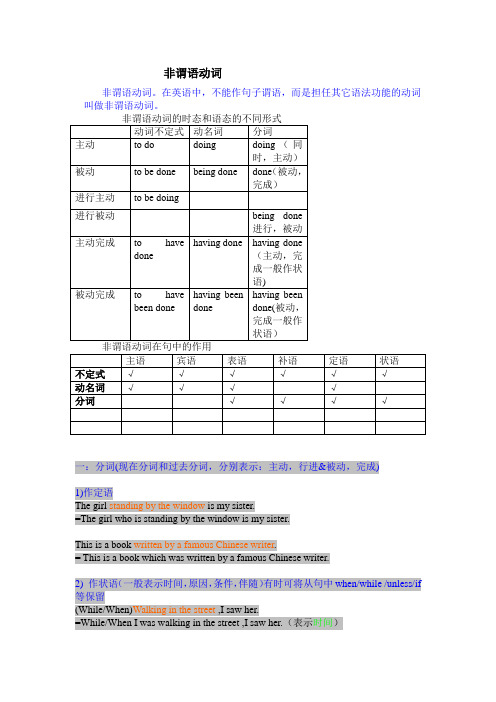
非谓语动词非谓语动词。
在英语中,不能作句子谓语,而是担任其它语法功能的动词叫做非谓语动词。
非谓语动词的时态和语态的不同形式动词不定式动名词分词主动to do doing doing(同时,主动)被动to be done being done done(被动,完成)进行主动to be doing进行被动being done进行,被动主动完成to havedone having done having done(主动,完成一般作状语)被动完成to havebeen done having beendonehaving beendone(被动,完成一般作状语)非谓语动词在句中的作用主语宾语表语补语定语状语不定式√√√√√√动名词√√√√分词√√√√一:分词(现在分词和过去分词,分别表示:主动,行进&被动,完成)1)作定语The girl standing by the window is my sister.=The girl who is standing by the window is my sister.This is a book written by a famous Chinese writer.= This is a book which was written by a famous Chinese writer.2) 作状语(一般表示时间,原因,条件,伴随)有时可将从句中when/while /unless/if 等保留(While/When)Walking in the street ,I saw her.=While/When I was walking in the street ,I saw her.(表示时间)Seen from the hill,our school looks more beautiful.=When our school is seen from the hill,it looks more beautiful.从小山上看,我们学校更美了。
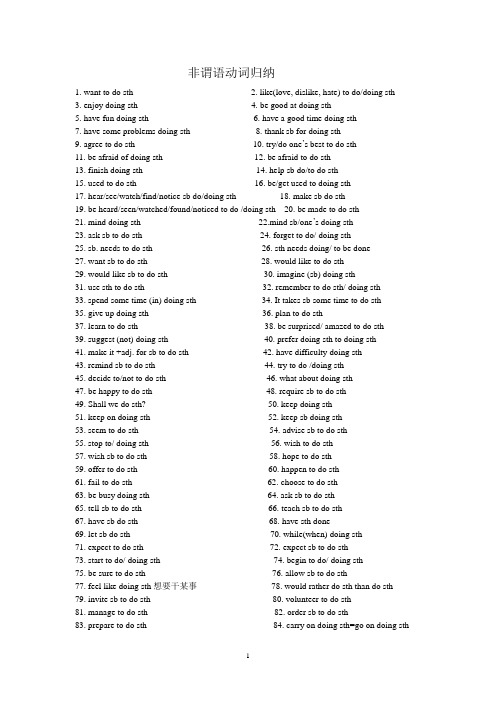
非谓语动词归纳1. want to do sth2. like(love, dislike, hate) to do/doing sth3. enjoy doing sth4. be good at doing sth5. have fun doing sth6. have a good time doing sth7. have some problems doing sth 8. thank sb for doing sth9. agree to do sth 10. try/do one’s best to do sth11. be afraid of doing sth 12. be afraid to do sth13. finish doing sth 14. help sb do/to do sth15. used to do sth 16. be/get used to doing sth17. hear/see/watch/find/notice sb do/doing sth 18. make sb do sth19. be heard/seen/watched/found/noticed to do /doing sth 20. be made to do sth21. mind doing sth 22.mind sb/one’s doing sth23. ask sb to do sth 24. forget to do/ doing sth25. sb. needs to do sth 26. sth needs doing/ to be done27. want sb to do sth 28. would like to do sth29. would like sb to do sth 30. imagine (sb) doing sth31. use sth to do sth 32. remember to do sth/ doing sth33. spend some time (in) doing sth 34. It takes sb some time to do sth35. give up doing sth 36. plan to do sth37. learn to do sth 38. be surprised/ amazed to do sth39. suggest (not) doing sth 40. prefer doing sth to doing sth41. make it +adj. for sb to do sth 42. have difficulty doing sth43. remind sb to do sth 44. try to do /doing sth45. decide to/not to do sth 46. what about doing sth47. be happy to do sth 48. require sb to do sth49. Shall we do sth? 50. keep doing sth51. keep on doing sth 52. keep sb doing sth53. seem to do sth 54. advise sb to do sth55. stop to/ doing sth 56. wish to do sth57. wish sb to do sth 58. hope to do sth59. offer to do sth 60. happen to do sth61. fail to do sth 62. choose to do sth63. be busy doing sth 64. ask sb to do sth65. tell sb to do sth 66. teach sb to do sth67. have sb do sth 68. have sth done69. let sb do sth 70. while(when) doing sth71. expect to do sth 72. expect sb to do sth73. start to do/ doing sth 74. begin to do/ doing sth75. be sure to do sth 76. allow sb to do sth77. feel like doing sth想要干某事78. would rather do sth than do sth 79. invite sb to do sth 80. volunteer to do sth81. manage to do sth 82. order sb to do sth83. prepare to do sth 84. carry on doing sth=go on doing sth85. continue to do/ doing sth 86. prevent/stop/keep sb from doing sth 87. why not do sth 88. prefer to do sth rather than do sth 89. encourage sb to do sth 90. There is no need to do sth91.be sure to do sth 92. warn sb to do sth93. try to do sth 94. try doing sth95. can’t wait to do sth 96. can’t help doing sth97. look forward to doing sth 98. make a contribution to doing sth 99. devote…to doing sth 100. practise doing sth101. promise to do sth 102. promise sb to do sth103. have no choice but to do sth 104. get ill from doing sth105. dare to do sth 106. be likely to do sth107. insist on doing sth 108. have no courage to do sth109. be worth doing 110. promise to do sth111. Can/Could/Will/Would you please do sth? 112. be busy doing sth113. avoid doing sth 114. miss doing sth115 Will/ Would / Can/ Could you please do/ not do sth?116. risk doing sth。
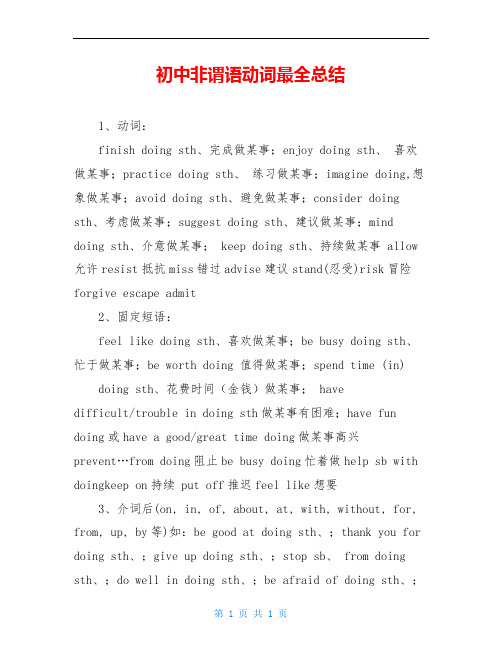
初中非谓语动词最全总结1、动词:finish doing sth、完成做某事;enjoy doing sth、喜欢做某事;practice doing sth、练习做某事;imagine doing,想象做某事;avoid doing sth、避免做某事;consider doing sth、考虑做某事;suggest doing sth、建议做某事;mind doing sth、介意做某事; keep doing sth、持续做某事 allow 允许resist抵抗miss错过advise建议stand(忍受)risk冒险forgive escape admit2、固定短语:feel like doing sth、喜欢做某事;be busy doing sth、忙于做某事;be worth doing 值得做某事;spend time (in) doing sth、花费时间(金钱)做某事; havedifficult/trouble in doing sth做某事有困难;have fun doing或have a good/great time doing做某事高兴prevent…from d oing阻止be busy doing忙着做help sb with doingkeep on持续 put off推迟feel like想要3、介词后(on, in, of, about, at, with, without, for, from, up, by等)如:be good at doing sth、;thank you for doing sth、;give up doing sth、;stop sb、 from doing sth、;do well in doing sth、;be afraid of doing sth、;be interested in doing sth、;be proud of;instead of;be fond of4、to作介词的情况look forward to doing sth期望做某事; prefer doing sth、 to doing sth与…相比较更喜欢…;pay attention to doing注意做某事; be/get used to doing sth、习惯于做某事;make a contribution to为…做贡献lead to ,stick to, object to, get down to, on the/way to, as to关于。
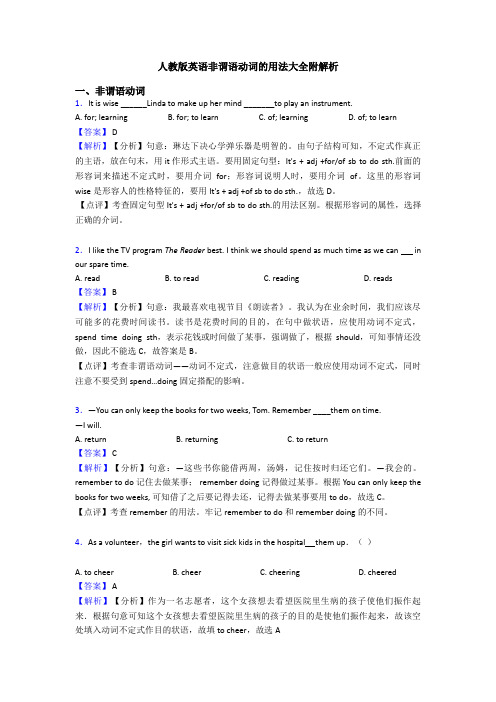
人教版英语非谓语动词的用法大全附解析一、非谓语动词1.It is wise ______Linda to make up her mind _______to play an instrument.A. for; learningB. for; to learnC. of; learningD. of; to learn【答案】 D【解析】【分析】句意:琳达下决心学弹乐器是明智的。
由句子结构可知,不定式作真正的主语,放在句末,用it作形式主语。
要用固定句型:It's + adj +for/of sb to do sth.前面的形容词来描述不定式时,要用介词for;形容词说明人时,要用介词of。
这里的形容词wise是形容人的性格特征的,要用It's + adj +of sb to do sth.,故选D。
【点评】考查固定句型It's + adj +for/of sb to do sth.的用法区别。
根据形容词的属性,选择正确的介词。
2.I like the TV program The Reader best. I think we should spend as much time as we can in our spare time.A. readB. to readC. readingD. reads【答案】 B【解析】【分析】句意:我最喜欢电视节目《朗读者》。
我认为在业余时间,我们应该尽可能多的花费时间读书。
读书是花费时间的目的,在句中做状语,应使用动词不定式,spend time doing sth,表示花钱或时间做了某事,强调做了,根据should,可知事情还没做,因此不能选C,故答案是B。
【点评】考查非谓语动词——动词不定式,注意做目的状语一般应使用动词不定式,同时注意不要受到spend…doing固定搭配的影响。
3.—You can only keep the books for two weeks, Tom. Remember ____them on time.—I will.A. returnB. returningC. to return【答案】 C【解析】【分析】句意:—这些书你能借两周,汤姆,记住按时归还它们。
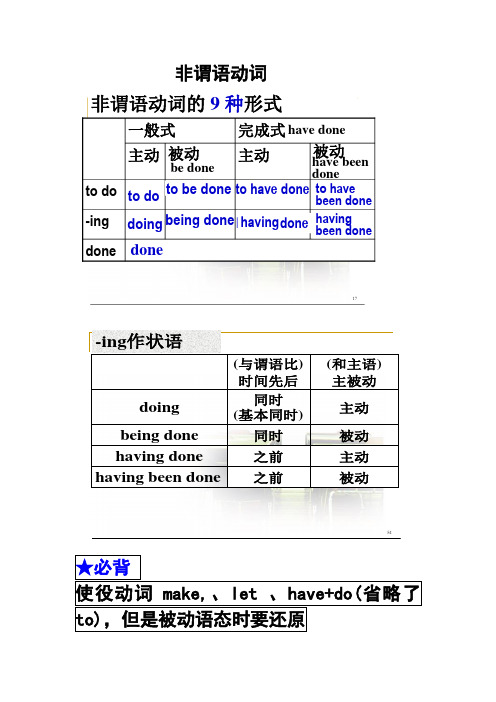
非谓语动词 17done -ing to do 被动主动被动主动完成式一般式to do doing doneto be done being done to have done have done to have been donehaving been done having be done have done have been done51被动之前having been done主动之前having done 被动同时being done 主动同时(基本同时)doing (和主语)主被动(与谓语比)时间先后-ing 作状语★必背使役动词make,、let 、have+do(省略了感官动词see/ watch/hear/feel1: +do(一般现在和一般过去,不强调正在进行都可用)I saw the boys fight with each other yesterday.PS: 被动态时需要还原“to ”The boys were seen to fight with each other yesterday.2: +doing (强调正在进行)The girl reported seeing a beautiful bird flying toward the window. 14非谓语动词题目三步走:⏹是否已存在另一个动作(不管前面还是后面)⏹主被动关系⏹时间先后顺序◆习题 ◆⏹S he reached the top of the hill andstopped on a big rock to see the rising sun.A. to have restedB. restingC. to restD. rest⏹Y ou were brave enough to raiseobjections at the meeting.Well, now I regret _ that.A. to doB. to be doingC. to have doneD. having done⏹T hey knew her very well. They hadseen her _ up from childhood.A. growB. grewC. was growingD. to grow⏹I’ve heard him _ about you often.A. talkedB. talksC. talkD. to talk⏹I f you think that treating a womanwell means always _ her permission for things,think again. (06湖南) A. gets B. got C. to get D. getting⏹H e walked down the hills, _ softly tohimself。

非谓语动词的用法大全含答案推荐精选一、非谓语动词1.Bruce practices basketball every day so that he can be a better player.A. playB. to playC. playing【答案】 C【解析】【分析】考查非谓语动词的用法。
句意:Bruce每天练习打篮球以便他能成为一位更好的运动员。
practice + doing sth练习做某事。
故选C。
2.—I think the environment is terrible these years.—Yes, it will be even worse the government takes action it.A. until; protectB. unless; to protectC. if; protecting【答案】 B【解析】【分析】句意:——我认为这几年来环境太糟糕了。
——是的,环境会变得更糟糕,除非政府采取措施保护环境。
A. until; 直到…为止,B. unless除非,如果不,连词;C. if 如果,连词;until和if放在这里,句意不通顺,take action to do sth. 采取行动去做某事,动词不定式作目的状语,故选B。
【点评】此题考查连词短语和固定搭配。
3. Whenever we kids come over, Auntie Susan just stands there and watches us ________ sure we don't break anything.A. makeB. madeC. to makeD. making【答案】 C【解析】【分析】句意:无论什么时候我们这些孩子们来到这里,Susan姨妈只是站在那里,看着我们以确保我们不打破什么东西。
此处是目的状语,故用动词不定式to make。
watch sb do/doing sth看着某人做了/正在做某事,但是make sure的意思是“保证;确保”,在本句中不符合逻辑,故排除AD;watch sth done看着某事被做,也不符合句意,故选C。
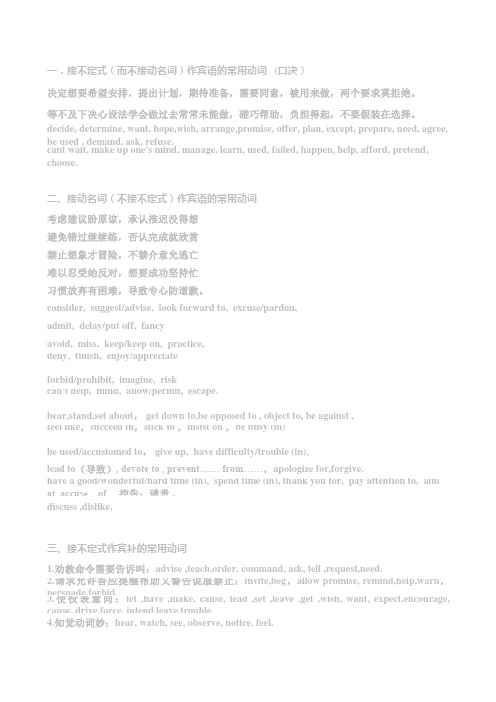
一.接不定式(而不接动名词)作宾语的常用动词 (口决)决定想要希望安排,提出计划,期待准备,需要同意,被用来做,两个要求莫拒绝。
等不及下决心设法学会做过去常常未能做,碰巧帮助,负担得起,不要假装在选择。
decide, determine, want, hope,wish, arrange,promise, offer, plan, except, prepare, need, agree, be used , demand, ask, refuse.cant wait, make up one's mind, manage, learn, used, failed, happen, help, afford, pretend, choose.二、接动名词(不接不定式)作宾语的常用动词考虑建议盼原谅,承认推迟没得想避免错过继续练,否认完成就欣赏禁止想象才冒险,不禁介意允逃亡难以忍受始反对,想要成功坚持忙习惯放弃有困难,导致专心防道歉。
consider, suggest/advise, look forward to, excuse/pardon,admit, delay/put off, fancyavoid, miss, keep/keep on, practice,deny, finish, enjoy/appreciateforbid/prohibit, imagine, riskcan't help, mind, allow/permit, escape.bear,stand,set about, get down to,be opposed to , object to, be against ,feel like,succeed in,stick to ,insist on ,be busy (in)be used/accustomed to, give up, have difficulty/trouble (in),lead to(导致), devote to , prevent…… from……,apologize for,forgive.have a good/wonderful/hard time (in), spend time (in), thank you for, pay attention to, aim at, accuse…of… 控告;谴责,discuss ,dislike,三、接不定式作宾补的常用动词1.劝教命令需要告诉叫:advise ,teach,order, command, ask, tell ,request,need.2.请求允许答应提醒帮助又警告说服禁止:invite,beg,allow promise,remind,help,warn,persuade,forbid.3.使役表意向:let,have,make,cause,lead,set,leave,get,wish,want,expect.encourage, cause, drive,force. intend,leave,trouble.4.知觉动词妙:hear, watch, see, observe, notice. feel.5.考虑相信猜测断言证明想象找到喜好选举爱:consider,think,believe,know,guess,declare,prove,imagine,suppose,find,love,hate,like, prefer, would like。

非谓语动词短语一.动词不定式(To do 式)1.asked sb. (not) to do sth. 请求某人(不)做某事2.tell /told sb. (not) to do sth. 告诉某人(不)做某事3.wanted sb. (not) to do sth. 想要某人(不)做某事4.warn sb. (not) to do sth. 警告某人(不)做某事5.allow sb. to do sth. 允许某人做某事6.invite sb. to do sth. 邀请某人做某事7.order sb. to do sth. 命令某人做某事8.teach sb. to do sth. 教某人做某事9.decide (not) to do sth. 决定做某事10.manage to do sth. 设法做某事11.have to do sth. 不得不做某事12.hope (sb.) to do sth. 希望做某事13.expect (sb.) to do sth. 期盼做某事14.prefer to do sth. 宁愿做某事15.refuse to do sth. 拒绝做某事16.happen to do sth. 碰巧做某事17.don’t need to do sth. 不必做某事18.promise to do sth. 答应做某事19.plan to do sth. 计划做某事20.failed to do sth. 未能做某事e(d) to do sth. 过去常常做某事22.so as (not) to do sth. 为了(不)做某事23.in order (not) to do sth. 为了(不)做某事24.be able to do sth. 有能力能做某事25.ought (not) to do sth. 应该做某事26.be determined to do sth. 有决心做某事27.be eager to do sth. 渴望做某事28.too…. to do sth. 太。
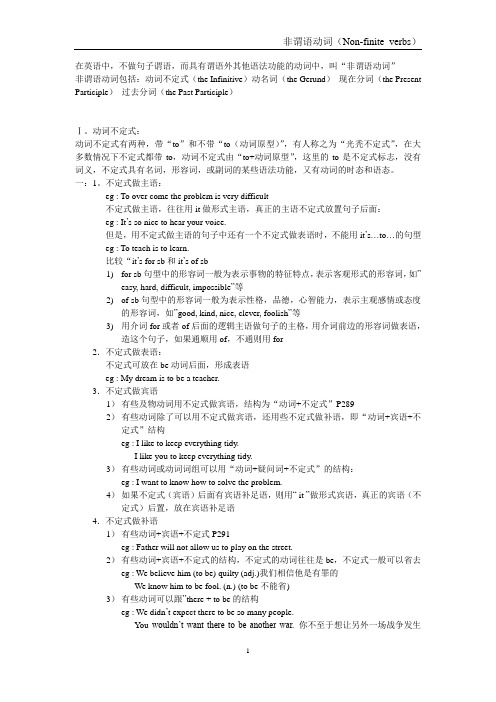
在英语中,不做句子谓语,而具有谓语外其他语法功能的动词中,叫“非谓语动词”非谓语动词包括:动词不定式(the Infinitive)动名词(the Gerund)现在分词(the Present Participle)过去分词(the Past Participle)Ⅰ。
动词不定式:动词不定式有两种,带“to”和不带“to(动词原型)”,有人称之为“光秃不定式”,在大多数情况下不定式都带to,动词不定式由“to+动词原型”,这里的to是不定式标志,没有词义,不定式具有名词,形容词,或副词的某些语法功能,又有动词的时态和语态。
一:1。
不定式做主语:eg : To over come the problem is very difficult不定式做主语,往往用it做形式主语,真正的主语不定式放置句子后面:eg : It‟s so nice to hear your voice.但是,用不定式做主语的句子中还有一个不定式做表语时,不能用it‟s…to…的句型eg : To teach is to learn.比较“it‟s for sb和it‟s of sb1)for sb句型中的形容词一般为表示事物的特征特点,表示客观形式的形容词,如”easy, hard, difficult, impossible”等2)of sb句型中的形容词一般为表示性格,品德,心智能力,表示主观感情或态度的形容词,如”good, kind, nice, clever, foolish”等3)用介词for或者of后面的逻辑主语做句子的主格,用介词前边的形容词做表语,造这个句子,如果通顺用of,不通则用for2.不定式做表语:不定式可放在be动词后面,形成表语eg : My dream is to be a teacher.3.不定式做宾语1)有些及物动词用不定式做宾语,结构为“动词+不定式”P2892)有些动词除了可以用不定式做宾语,还用些不定式做补语,即“动词+宾语+不定式”结构eg : I like to keep everything tidy.I like you to keep everything tidy.3)有些动词或动词词组可以用“动词+疑问词+不定式”的结构:eg : I want to know how to solve the problem.4)如果不定式(宾语)后面有宾语补足语,则用“ it ”做形式宾语,真正的宾语(不定式)后置,放在宾语补足语4.不定式做补语1)有些动词+宾语+不定式P291eg : Father will not allow us to play on the street.2)有些动词+宾语+不定式的结构,不定式的动词往往是be,不定式一般可以省去eg : We believe him (to be) quilty (adj.)我们相信他是有罪的We know him to be fool. (n.) (to be不能省)3)有些动词可以跟”there + to be的结构eg : We didn‟t expect there to be so many people.You wouldn‟t want there to be another war. 你不至于想让另外一场战争发生吧?5.不定式做定语不定式做宾语,通常要放在被修饰的词后,往往表示未发生的动作。

非谓语动词(完整版)非谓语动词(完整版)一、单项选择非谓语动词1.The woman began to cry when asked how her husband was injured.解析:本句中,how引导的是宾语从句,asked是谓语动词,所以用过去分词作状语,表示被动,故选A。
2.XXX tasted terrible。
so it was thrown away by the child.解析:本句中,taste与主语medicine是主动关系,而且taste是系动词无被动,因此用现在分词tasting作状语,表示主动,故选B。
3.A XXX。
XXX for over half an hour.解析:本句中,leaving与主语laugh构成主动关系,表示结果,所以用现在分词,故选C。
4.When asked for his views about his teaching job。
Philip said he found it very interesting and rewarding.解析:本句中,when引导的是省略句,完整的是when he was asked his view about his job as a teacher,这里当从句中的主语与主句的主语一致,并且从句的谓语动词有be时,这时从句的主语与be同时省略,故选B。
二、改写句子1.Being asked how her husband was injured。
XXX.2.XXX.3.A XXX for over half an hour.4.Philip found XXX when he was asked for his views about it.1.The company has decided to implement a new policy to ce the use of plastic bags。

非谓语动词归纳总结一,非谓语动词的形式变化及其意义二,非谓语动词的运用及考题形式形式1,(If/Unless/When/Though/As)( )----------------------,句子(主语+谓语+宾语-----)(1)To do-----表目的(为了),发生谓语动词后,后面常带宾语(2)Doing/Having done----(当---时,如果,虽然,因为),后面常带宾语(3)Done/Having been done----(当---时,如果,虽然,因为),后面不带宾〖注意〗:1,(Do )---------------, and/but/or/if/when/before/after+主语+谓语+--------这是祈使句,所以用动词原2,(Doing/Being done)------------------is/was(谓语动词)-----------------------------------.这是用动名词作主语〖例证〗:1,______(look)carefully,and you can find the differences between the two pictures.2,______(look)after his aged mother, he gave up the chance to go abroad for further study.3,_______(look) after yourself well is important when you are alone abroad.4,_______(look) after well by the nurse, the old man recovered quite quickly.5,_______(look) after well is a kind of love that our parents gave us.6,_______(look) for the book for a long time, he finally bought it in a bookstore occasionally.7,_______(look) after well by the nurse for two months,the old man finally recovered.形式2主语+谓语+宾语+------,()+------------1,doing(及物动词后面跟宾语)表示伴随,结果,方式2,done(及物动词后面不跟宾语)表示伴随,结果,方式3,only to do表示结果〖例证〗1,A hearty laughter releases physical tension, ( )(leave) our muscle relaxed for half an hour. 2,The old grandma got off the bus, ()(support)by her granddaughter.3,We hurried to the railway station, only( )(find) the train had already left.4,He got up,washed his faces,had his breakfast, and( )(go) to work.形式3主语()+ 谓语+ 宾语()+-------------1,to do将要做的to be done将被做的(作定语或宾语补足语)2,doing正在做的being done正在被---的(作定语或宾语补足语)3,done被----了的(作定语或宾语补足语)〖例证〗1,Anyone________(see)________(carry)bags,boxes,cases was stopped by the police.(作定语)2,Steam can be seen__________(rise) when water is heated.(作主语补足语)3,Seeing the roads _____(cover) with snow and ice, we decided to stay at home.(作宾语补足语)4,The building _________(complete) next month will be used as a laboratory.(作定语)5,The problem______(discuss) now is not the one _____(discuss)at yesterday’s meeting (作定语)6,He spoke loudly enough to make himself __________(hear) clearly.(作宾语补足语)7,The government has taken effective measures________(improve) the air condition in Beijing.(作目的状语)8,Don’t keep the water ________(run) when you brush teeth.(作宾语补足语)三,固定搭配1,跟不定式作宾语的动词Aim,appear,agree,arrange,decide,choose,demand,desire,determine,expect,hope,fail,happen, hesitate,learn,mean,manage,offer,plan,prepare,pretend,promise,refuse,attempt,want2,跟动名词作宾语的动词Consider,suggest,advise,excuse,pardon,admit,delay,putoff,fancy,avoid,miss,keep,practice,deny,finish,enjoy,appreciate,can’t help,forbid,imagine,risk,mind,allow,permit,escape3,to后面跟动名词的短语Be/get used to,be related to,be addicted to,be opposed to,be devoted to,be adjusted to,be connected to,be compared to,lead to,object to,look forward to,stick to,pay attention to,contribute to,make contributions to,reply to,turn to,belong to,respond to。

高中英语语法:非谓语动词总结-大全非谓语动词的含义非谓语动词首先是一种动词形式,其次是这种动词形式不能做谓语,综合这两点,我们将其叫做非谓语动词。
非谓语动词的形式非谓语动词包含四种形式,即不定式、动名词、现在分词和过去分词。
其中,每种形式按照发生时间和主被动又包括不同的子形式。
具体如下:1. 不定式①基本形式:to do(表示主动,并且一般表示将来)②被动式:to be done(表示被动,并且一般表示将来)③进行式:to be doing (表示主动和进行)④完成时:to have done(表示主动和完成)⑤完成被动式:to have been done(表示被动和完成)⑥完成进行式:to have been doing (表示主动和完成进行)The teacher told us to do morning exercises. 老师让我们做早操。
The car to be bought is for his sister. 要买的这辆车是给他的姐姐的。
She pretended to be reading when the teacher came into the classroom. 老师进来时,她假装正在读书。
The thief is said to have escaped. 据说小偷已经逃跑了。
The thief is said to have been arrested. 据说小偷已经被抓住了。
She is said to have been working in the factory over the last 20 years. 据说在过去的20年里,她一直在这家工厂工作。
2. 动名词①基本形式:doing (表示主动)②被动式:being done(表示被动)③完成式:having done(表示主动和完成)④完成被动式:having been done(表示被动和完成)Travelling in space by ordinary people will be common in the future. 在未来,普通人在太空旅行将会是普遍的事情。
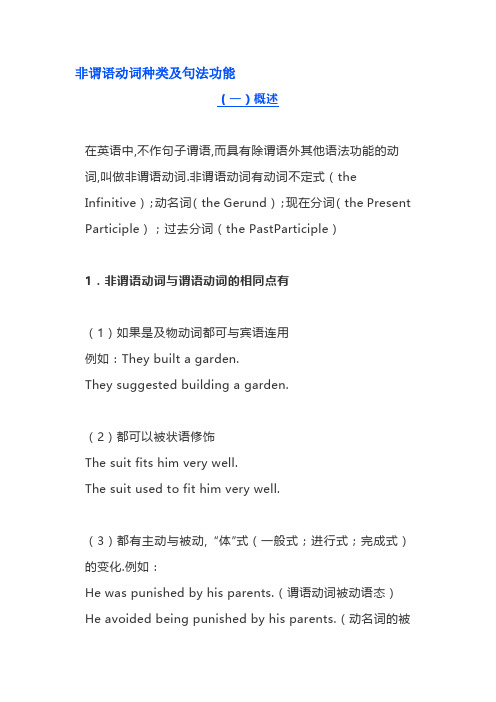
非谓语动词种类及句法功能(一)概述在英语中,不作句子谓语,而具有除谓语外其他语法功能的动词,叫做非谓语动词.非谓语动词有动词不定式(the Infinitive);动名词(the Gerund);现在分词(the Present Participle);过去分词(the PastParticiple)1.非谓语动词与谓语动词的相同点有(1)如果是及物动词都可与宾语连用例如:They built a garden.They suggested building a garden.(2)都可以被状语修饰The suit fits him very well.The suit used to fit him very well.(3)都有主动与被动, “体”式(一般式;进行式;完成式)的变化.例如:He was punished by his parents.(谓语动词被动语态)He avoided being punished by his parents.(动名词的被动式)We have written the composition.(谓语动词的完成时)Having written the composition, we handed it in.(现在分词的完成式)(4)都可以有逻辑主语They started the work at once.(谓语动词的逻辑主语)The boss ordered them to start the work.(动词不定式的逻辑主语)We are League members.(谓语动词的主语)We being League member, the work was well done.(现在分词的逻辑主语)2、非谓语动词与谓语动词的不同点有(1)非谓语动词可以有名词作用(如动词不定式和动名词),在句中做主语、宾语、表语.(2)非谓语动词可以有形容词作用(如动词不定式和分词),在句中做定语、表语或宾语补足语.(3)非谓语动词可以有副词作用(如动词不定式和分词),在句中作状语.(二)非谓语动词用法(一)动词不定式:(to)+do,具有名词、形容词、副词的特征.1.不定式的形式:(以动词write为例)否定式:not + (to) do(1)一般式:不定式的一般式所表示的动作与谓语动词动作同时发生或发生在谓语动词动作之后,例如:I'm glad to meet you.He seems to know a lot.We plan to pay a visit.(2)进行式:不定式的进行式所表示的动作与谓语动词动作同时发生,例如:The boy pretended to be working hard.He seems to be reading in his room.(3)完成式:不定式的完成式表示的动作发生在谓语动词动作之前,例如:I regretted to have told a lie.I happened to have seen the film.He is pleased to have met his friend.2.不定式的句法功能(1)做主语:To finish the work in ten minutes is very hard.To lose your heart means failure.动词不定式短语做主语时,常用it作形式主语,例如上面两句可用如下形式:It is very hard to finish the work in ten minutes.It means failure to lose your heart.(2)作表语:Her job is to clean the hall.He appears to have caught a cold.(3)作宾语:常与不定式做宾语连用的动词有:want, hope, wish, offer, fail, plan,learn, pretend, refuse, manage, help, agree, promise, prefer, 如果不定式(宾语)后面有宾语补足语,则用it作形式宾语,真正的宾语(不定式)后置,放在宾语补足语后面,例如:Marx found it important to study the situation in Russia.(4)作宾语补足语:在复合宾语中,动词不定式可充当宾语补足语,如下动词常跟这种复合宾语:want , wish, ask, tell, order, beg, permit, help, advise, persuade,allow, prepare, cause, force, call on, wait for, invite.此外,介词有时也与这种复合宾语连用,如:With a lot of work to do, he didn't go to the cinema.有些动词如make, let, see, watch, hear, feel, have等与不带有to的不定式连用,但改为被动语态时,不定式要加to 如:I saw him cross the road.He was seen to cross the road.(5)作定语:动词不定式作定语,放在所修饰的名词或代词后.与所修饰名词有如下关系:①动宾关系:I have a meeting to attend.注意:不定式为不及物动词时,所修饰的名词如果是地点、工具等,应有必要的介词如:He found a good house to live in.The child has nothing to worry about.What did you open it with?如果不定式修饰time, place, way,可以省略介词:He has no place to live.This is the best way to work out this problem.如果不定式所修饰名词是不定式动作承受者,不定式可用主动式也可用被动式:Have you got anything to send?Have you got anything to be sent?②说明所修饰名词的内容:We have made a plan to finish the work.③被修饰名词是不定式逻辑主语:He is the first to get here.(6)作状语:①表目的:He worked day and night to get the money.She sold her hair to buy the watch chain.注意不定式放句首时,逻辑主语与句子主语要一致:wrong:To save money, every means has been tried. right:To save money, he has tried every means. wrong:To learn English well, a dictionary is needed. right:To learn English well, he needs a dictionary.②表结果:He arrived late to find the train gone.常用only放在不定式前表示强调:I visited him only to find him out.③表原因:They were very sad to hear the news.④表程度:It's too dark for us to see anything.The question is simple for him to answer.(7)作独立成分:To tell you the truth, I don't like the way he talked. (8)不定式的省略:保留to省略do动词.If you don't want to do it, you don't need to.(9)不定式的并列:第二个不定式可省略to.He wished to study medicine and become a doctor.(二)动名词动名词既具有动词的一些特征,又具有名词的句法功能.1.动名词的形式:否定式:not + 动名词(1)一般式:Seeing is believing. 眼见为实.(2)被动式:He came to the party without being invited.他未被邀请就来到了晚会.(3)完成式:We remembered having seen the film. 我们记得看过这部电影.(4)完成被动式:He forgot having been taken to Guangzhou when he was five years old.他忘记五岁时曾被带到广州去过.(5)否定式:not + 动名词I regret not following his advice. 我后悔没听他的劝告. (6)复合结构:物主代词(或名词所有格)+ 动名词He suggested our trying it once again. 他建议我们再试一次.His not knowing English troubled him a lot.他不懂英语给他带来许多麻烦.2.动名词的句法功能:(1)作主语:Reading aloud is very helpful. 朗读是很有好处的. Collecting stamps is interesting. 集邮很有趣.当动名词短语作主语时常用it作形式主语.It's no use quarrelling.争吵是没用的.(2)作表语:In the ant city, the queen's job is laying eggs.在蚂蚁王国,蚁后的工作是产卵.(3)作宾语:They haven't finished building the dam. 他们还没有建好大坝.We have to prevent the air from being polluted.我们必须阻止空气被污染.注意动名词既可作动词宾语也可作介词宾语,如上面两个例句.此外,动名词作宾语时,若跟有宾语补足语,则常用形式宾语it例如:We found it no good making fun of others. 我们发现取笑他人不好.要记住如下动词及短语只跟动名词作宾语:enjoy, finish, suggest, avoid(避免), excuse ,delay,imagine, keep, miss, consider, admit(承认),deny(否认), mind, permit, forbid, practise, risk(冒险),appreciate(感激), be busy, be worth, feel like, can'tstand, can't help(情不自禁地), think of, dream of, be fondof, prevent…(from),keep …from,stop…(from),protect…from, set about, be engaged in, spend…(in),succeed in, be used to, look forward to, object to, pay attention to, insiston, feel like(4)作定语:He can't walk without a walking-stick. 他没有拐杖不能走路.Is there a swimming pool in your school? 你们学校有游泳池吗?(5)作同位语:The cave, his hiding-place is secret. 那个山洞,他藏身的地方很秘密.His habit, listening to the news on the radio remains unchanged.他收听收音机新闻节目的习惯仍未改变.(三)现在分词现在分词既具有动词的一些特征,又具有形容词和副词的句法功能.1、现在分词的形式:否定式:not + 现在分词(1)现在分词的主动语态:现在分词主动语态的一般式表示与谓语动词所表示的动作同时发生,完成式表示的动作在谓语动词所表示的动作之前发生,常作状语.例如:They went to the park, singing and talking. 他们边唱边说向公园走去.Having done his homework, he played basket-ball. 做完作业,他开始打篮球.(2)现在分词的被动语态:一般式表示与谓语动词同时发生的被动的动作,完成式表示发生在谓语动词之前的被动的动作. The problem being discussed is very important. 正在被讨论的问题很重要.Having been told many times, the naughty boy made the same mistake.被告诉了好几遍,这个淘气的孩子又犯了同一个错误.2.现在分词的句法功能:(1)作定语:现在分词作定语,当分词单独做定语时,放在所修饰的名词前;如果是分词短语做定语放在名词后.In the following years he worked even harder.在后来的几年中,他学习更努力了.The man speaking to the teacher is our monitor's father. 正与老师谈话的那个人是我们班长的父亲.现在分词作定语相当于一个定语从句的句法功能,如:in thefollowing years也可用in the years that followed; the manspeaking to the teacher可改为the man who is speaking tothe teacher.(2)现在分词作表语:The film being shown in the cinema is exciting. 正在这家上演的电影很棒.The present situation is inspiring. 当前的形势鼓舞人心.be + doing既可能表示现在进行时,也可能是现在分词做表语,它们的区别在于be + doing表示进行的动作是进行时,而表示特征时是系动词be与现在分词构成系表结构.(3)作宾语补足语:如下动词后可跟现在分词作宾语补足语:see, watch, hear, feel, find, get, keep, notice, observe, listen to, look at,leave, catch等.例如:Can you hear her singing the song in the next room? 你能听见她在隔壁唱歌吗?He kept the car waiting at the gate. 他让小汽车在门口等着.(4)现在分词作状语:①作时间状语:(While) Working in the factory, he was an advanced worker.在工厂工作时,他是一名先进工人.②作原因状语:Being a League member, he is always helping others. 由于是共青团员,他经常帮助他人.③作方式状语,表示伴随:He stayed at home, cleaning and washing. 他呆在家里,又擦又洗.④作条件状语:(If) Playing all day, you will waste your valuable time. 要是整天玩,你就会浪费宝贵的时间.⑤作结果状语:He dropped the glass, breaking it into pieces. 他把杯子掉了,结果摔得粉碎.⑥作目的状语:He went swimming the other day. 几天前他去游泳了.⑦作让步状语:Though raining heavily, it cleared up very soon.虽然雨下得很大,但不久天就晴了.⑧与逻辑主语构成独立主格:I waiting for the bus, a bird fell on my heard.我等汽车时,一只鸟落到我头上.All the tickets having been sold out, they went away disappointedly.所有的票已经卖光了,他们失望地离开了.Time permitting, we'll do another two exercises.如果时间允许,我们将做另两个练习.有时也可用with (without) +名词(代词宾格)+分词形式With the lights burning, he fell asleep. 他点着灯睡着了.⑨作独立成分:udging from(by) his appearance, he must be an actor. 从外表看,他一定是个演员.Generally speaking, girls are more careful. 一般说来,女孩子更细心.(四)过去分词过去分词只有一种形式:规则动词由动词原形加词尾-ed构成.不规则动词的过去分词没有统一的规则要求,要一一记住。
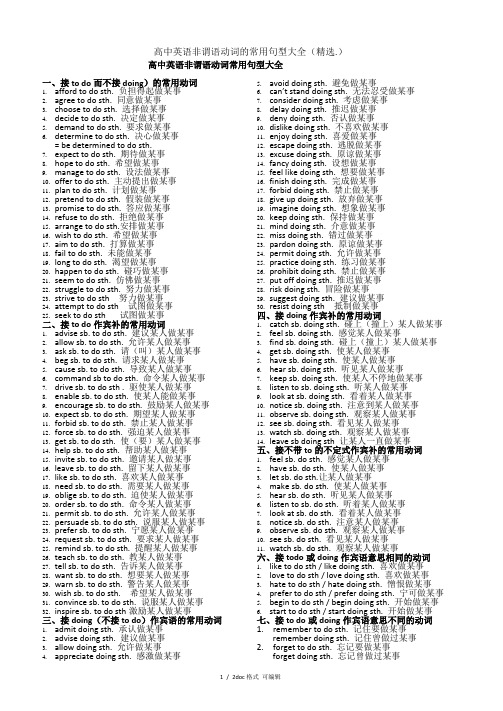
高中英语非谓语动词的常用句型大全(精选.)高中英语非谓语动词常用句型大全一、接to do而不接doing)的常用动词1.afford to do sth. 负担得起做某事2.agree to do sth. 同意做某事3.choose to do sth. 选择做某事4.decide to do sth. 决定做某事5.demand to do sth. 要求做某事6.determine to do sth. 决心做某事= be determined to do sth.7.expect to do sth. 期待做某事8.hope to do sth. 希望做某事9.manage to do sth. 设法做某事10.offer to do sth. 主动提出做某事11.plan to do sth. 计划做某事12.pretend to do sth. 假装做某事13.promise to do sth. 答应做某事14.refuse to do sth. 拒绝做某事15.arrange to do sth.安排做某事16.wish to do sth. 希望做某事17.aim to do sth. 打算做某事18.fail to do sth. 未能做某事19.long to do sth. 渴望做某事20.happen to do sth. 碰巧做某事21.seem to do sth. 仿佛做某事22.struggle to do sth. 努力做某事23.strive to do sth 努力做某事24.attempt to do sth 试图做某事25.seek to do sth 试图做某事二、接to do作宾补的常用动词1.advise sb. to do sth. 建议某人做某事2.allow sb. to do sth. 允许某人做某事3.ask sb. to do sth. 请(叫)某人做某事4.beg sb. to do sth. 请求某人做某事5.cause sb. to do sth. 导致某人做某事mand sb to do sth. 命令某人做某事7.drive sb. to do sth . 驱使某人做某事8.enable sb. to do sth. 使某人能做某事9.encourage sb. to do sth. 鼓励某人做某事10.expect sb. to do sth. 期望某人做某事11.forbid sb. to do sth. 禁止某人做某事12.force sb. to do sth. 强迫某人做某事13.get sb. to do sth. 使(要)某人做某事14.help sb. to do sth. 帮助某人做某事15.invite sb. to do sth. 邀请某人做某事16.leave sb. to do sth. 留下某人做某事17.like sb. to do sth. 喜欢某人做某事18.need sb. to do sth. 需要某人做某事19.oblige sb. to do sth. 迫使某人做某事20.order sb. to do sth. 命令某人做某事21.permit sb. to do sth. 允许某人做某事22.persuade sb. to do sth. 说服某人做某事23.prefer sb. to do sth. 宁愿某人做某事24.request sb. to do sth. 要求某人做某事25.remind sb. to do sth. 提醒某人做某事26.teach sb. to do sth. 教某人做某事27.tell sb. to do sth. 告诉某人做某事28.want sb. to do sth. 想要某人做某事29.warn sb. to do sth. 警告某人做某事30.wish sb. to do sth. 希望某人做某事31.convince sb. to do sth. 说服某人做某事32.inspire sb. to do sth激励某人做某事三、接doing(不接to do)作宾语的常用动词1.admit doing sth. 承认做某事2.advise doing sth. 建议做某事3.allow doing sth. 允许做某事4.appreciate doing sth. 感激做某事5.avoid doing sth. 避免做某事6.can’t stand doing sth. 无法忍受做某事7.consider doing sth. 考虑做某事8.delay doing sth. 推迟做某事9.deny doing sth. 否认做某事10.dislike doing sth. 不喜欢做某事11.enjoy doing sth. 喜爱做某事12.escape doing sth. 逃脱做某事13.excuse doing sth. 原谅做某事14.fancy doing sth. 设想做某事15.feel like doing sth. 想要做某事16.finish doing sth. 完成做某事17.forbid doing sth. 禁止做某事18.give up doing sth. 放弃做某事19.imagine doing sth. 想象做某事20.keep doing sth. 保持做某事21.mind doing sth. 介意做某事22.miss doing sth. 错过做某事23.pardon doing sth. 原谅做某事24.permit doing sth. 允许做某事25.practice doing sth. 练习做某事26.prohibit doing sth. 禁止做某事27.put off doing sth. 推迟做某事28.risk doing sth. 冒险做某事29.suggest doing sth. 建议做某事30.resist doing sth 抵制做某事四、接doing作宾补的常用动词1.catch sb. doing sth. 碰上(撞上)某人做某事2.feel sb. doing sth. 感觉某人做某事3.find sb. doing sth. 碰上(撞上)某人做某事4.get sb. doing sth. 使某人做某事5.have sb. doing sth. 使某人做某事6.hear sb. doing sth. 听见某人做某事7.keep sb. doing sth. 使某人不停地做某事8.listen to sb. doing sth. 听某人做某事9.look at sb. doing sth. 看着某人做某事10.notice sb. doing sth. 注意到某人做某事11.observe sb. doing sth. 观察某人做某事12.see sb. doing sth. 看见某人做某事13.watch sb. doing sth. 观察某人做某事14.leave sb doing sth 让某人一直做某事五、接不带to的不定式作宾补的常用动词1.feel sb. do sth. 感觉某人做某事2.have sb. do sth. 使某人做某事3.let sb. do sth.让某人做某事4.make sb. do sth. 使某人做某事5.hear sb. do sth. 听见某人做某事6.listen to sb. do sth. 听着某人做某事7.look at sb. do sth. 看着某人做某事8.notice sb. do sth. 注意某人做某事9.observe sb. do sth. 观察某人做某事10.see sb. do sth. 看见某人做某事11.watch sb. do sth. 观察某人做某事六、接todo或doing作宾语意思相同的动词1.like to do sth / like doing sth. 喜欢做某事2.love to do sth / love doing sth. 喜欢做某事3.hate to do sth / hate doing sth. 憎恨做某事4.prefer to do sth / prefer doing sth. 宁可做某事5.begin to do sth / begin doing sth. 开始做某事6.start to do sth / start doing sth. 开始做某事七、接to do或doing作宾语意思不同的动词1. remember to do sth. 记住要做某事remember doing sth. 记住曾做过某事2. forget to do sth. 忘记要做某事forget doing sth. 忘记曾做过某事3. regret to say /inform/tell sth.遗憾要做某事regret doing sth. 后悔(遗憾)曾做过某事4. try to do sth. 设法要做某事try doing sth. 做某事试试看有何效果5. mean to do sth. 打算做某事mean doing sth. 意味着做某事6. can’t help to do sth. 不能帮助做某事can’t help doing sth. 禁不住做某事7. go on to do sth. 做完某事后接着做另一事go on doing sth. 继续做一直在做的事8. stop to do sth. 停下来去做某事(不定式作状语)stop doing sth. 停止做某事八、可用于“动词+sb+for doing sth”的常见动词1.blame sb. for doing sth. 指责某人做某事2.criticize sb. for doing sth. 批评某人做某事3.forgive sb. for doing sth. 原谅某人做某事4.excuse sb. for doing sth. 原谅某人做某事5.pardon sb. for doing sth. 原谅某人做某事6.punish sb. for doing sth. 惩罚某人做某事7.scold sb. for doing sth. 指责(责备)某人做某事8.thank sb. for doing sth. 感谢某人做某事九、带to doing sth.的常用结构1.be used to doing sth. 习惯于做某事= be accustomed to doing sth.2.devote oneself to doing sth. 献身于做某事devote sth. to doing sth. 把……献给做某事be devoted to doing sth. 把时间(钱,精力等)献给做某事3.look forward to doing sth. 盼望做某事4.stick to doing sth. 坚持做某事5.refer to doing sth 提到做某事6.pay attention to doing 注意做某事7.object to doing sth反对做某事8.lead to doing 导致做某事9.contribute to doing有助于做某事10.the key to doing sth. 做某事的关键十、接doing主动形式表示被动含义的常用词1.want doing = want to be done.2.need doing=need to be done.3.require doing =requiret to be done.4.deserve doing= deserve to be done.最新文件仅供参考已改成word文本。
非谓语动词不定式(infinitive)I.基本形式:“to+动词原形”。
有时to可省略。
不能作谓语,没有人称和数的变化。
既具有动词的特征----可以有自己的宾语和状语,又具有名词,形容词和副词的句法功能。
II.不定式的主动语态与被动语态:a. 一般式:表示谓语动词的动作与不定式的动作几乎同时发生,或发生在谓语动作之后。
We must learn to speak EnglishI want to be a scientist when I grow up.b. 完成式:表示不定式的动作早于谓语动词的动作发生。
I’m sorry to have given you so much trouble.It’s a good thing for him to have been criticized.c.进行式:表示谓语动词的动作发生的时候,不定式的动作正在进行。
He seems to be waiting for somebody.He pretended to be listening attentively.注:在某些结构中(尤其做宾语时,不定式虽然表被动,但是用主动形式表示。
1)在的there be句式中,不定式的主动式可表被动的意思。
There is no matter to drink here.2)当不定式与前面的名词构成动宾关系,又与另一代词或名词构成主谓关系,这时不定式的主动可以表被动。
We have many difficulties to overcome.The next thing for them to do is to sweep the floor.He has no one to take care of.3)当不定式做表语形容词的状语,又和句中的主语构成动宾关系,这时不定式的主动形式表被动意味。
常可这样用的形容词一般1有以下几个:easy ,difficult , afraid, hard ,heavy ,pleasant, nice, dangerous, important, interesting, bitter, light 等。
They found the report was hard to understand.4) to let(出租),blame用主动代替被动形式表被动意味。
The car is to let.III.句法功能:1)做主语:当主语是个动宾结构时,或动状结构时,这时用不定式做主语。
To learn English well is not easy.不定式短语做主语时,为了保持句子的平衡,往往以先行词做形式主语,而把不定式短语置于谓语动词之后。
It’s so nice to hear your voice.It cost us 5 0000 yuan to build the house.2)作表语:a. 当表语是动宾结构或动状结构时,用不定式做表语。
My job is to raise pigs.b.当主语是不定式时,表语也要用不定式。
To see is to believe.c.主语是由动词转化或派生而来的名词,如果原动词要求接不定式,则表语也应当用不定式。
to buy a new car.My wish/hope/ idea/plan/purpose/intention is to visit Africa.to be a college student3)作宾语:某些动词后,只能用不定式作宾语。
如:allow ,afford, agree, apply, arrange, ask, choose, claim, decide, demand, desire, determine, expect, hope, wish, learn, manage,offer, pretend, promise, refuse, threaten等。
We decided not to go with the work.Einstein once refused to speak on the radio for $ 1,000 a minute.有些动词既可接不定式作宾语,也可接动名词作宾语,如:want,begin ,start, remember, need, forget, like, learn等,含义稍有不同。
区别将在非谓语用法区别中讲解。
注:a. 如果作宾语的不定式有自己的补语,则一般用先行词it做形式宾语,而将真正的宾语不定式后置。
Do you think it better to translate in this way?They found it impossible to get there everything ready in time.2b. 不定式一般不做介词宾语,只有在极少数介词如:but, except ,besieds等后才行。
此时不定式可带to或不带to。
But前无动词do时,其后接带to的不定式:but前有动词do时,其后的不定式to常省略。
In very cold winter weather a cold-blooded creature has no choice but to lie down and sleep.There was clearly nothing left to do but sit down on the little coach and weep.What do you like to do besides swim.但“疑问词+不定式”结构可以用做介词宾语.I have no idea about what to do next.The first was the question of what to call it4)宾语补足语: 常带有不定式做宾语补足语的动词有(1). ask, force, expect, encourage, teach, cause, allow, beg,forbid, invite, permit, persuade, remind, want, warn, tell等.He told me to make a sentence with the word.(2). see, watch, notice, observe ; let, make, have ; listen tohear ;feel 这些动词后的不定式宾补,要省略“to”. 但要变为被动语态时,要加上toShe had the pupils work out the problem.5). 定语: 放在它所修饰的名词或代词之后.不定式与它所修饰的名词或名词词组之间的关系为 A: 名词或名词词组是不定式的逻辑宾语; B:名词或名词词组为不定式的逻辑主语. C:名词或名词词组与不定式既无动宾关系又无主谓关系A: He gave me something to eat.B: He needs someone to help him with his work..C: I have no time to do it.He has no money to buy the car.We must find a place to live.I have a better way to repair it.注: 带疑问词的不定式不直接做定语:(x ) That’s the only way how to solve the problem.That’s the only way to solve the problem.不定式做定语时可带逻辑主语,而且常用for引出.I have a letter for you to read.不定式一般作定语时,往往含有将来,必须等附加意味,相当一个定语从句.36)状语:目的状语:Yesterday I went to the station to meet my old brother.Mr. Smith came to China to study Chinese.常用的强调目的的短语in order to; so as to 结果状语:He returned home to hear that his con has just join the army.He hurried to the school to find nobody there.常用的短语:so (such… as to +v.) ; too….to ; enough to +v.原因状语:(常表示喜怒哀乐等情绪)We were very excited to hear the news.I’m glad to see you.表语形容词状语:结构为 be +adj. +to do sth.The article is easy to read.The man is hard to work with.We likely to attend the class.7)“疑问词+不定式”结构:主语: How to get rid of these things is a big question.宾语:I hardly knew how to write.表语:The question is where to find the answer.8)定式的省略:A: 当两个或两个以上的不定式并列在一起时,第一个不定式带to,后面的不定式往往把to省去。
Eg:I wished to finish my task and (to) get away. 但是如果在对照的场合,则不可以省去:It is better to laugh than to cry. B: 在感官动词see, hear, feel, watch, notice observe, listen to , look at 和使役动词let, make have的复合宾语中,不定式须省去to被动语态中要加上to.C: 在why引起的句子中省去to: Why not do it right now?Why quarrel with him?D: 在一些固定搭配后面,如:had better; would/had rather; but等,不用toE: help sb. (to) do sth.此句式中,可用to也可不用to.-ing form-ing form 既具有动词的一些特征(可带自己的宾语又可有自己的状语)又具有形容词,副词(现在分词)和名词(动名词)的句法功能。